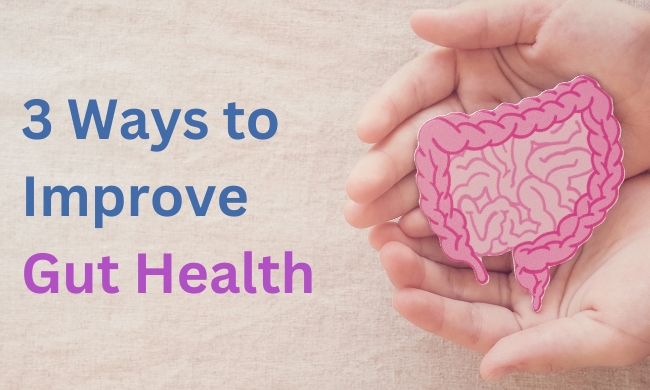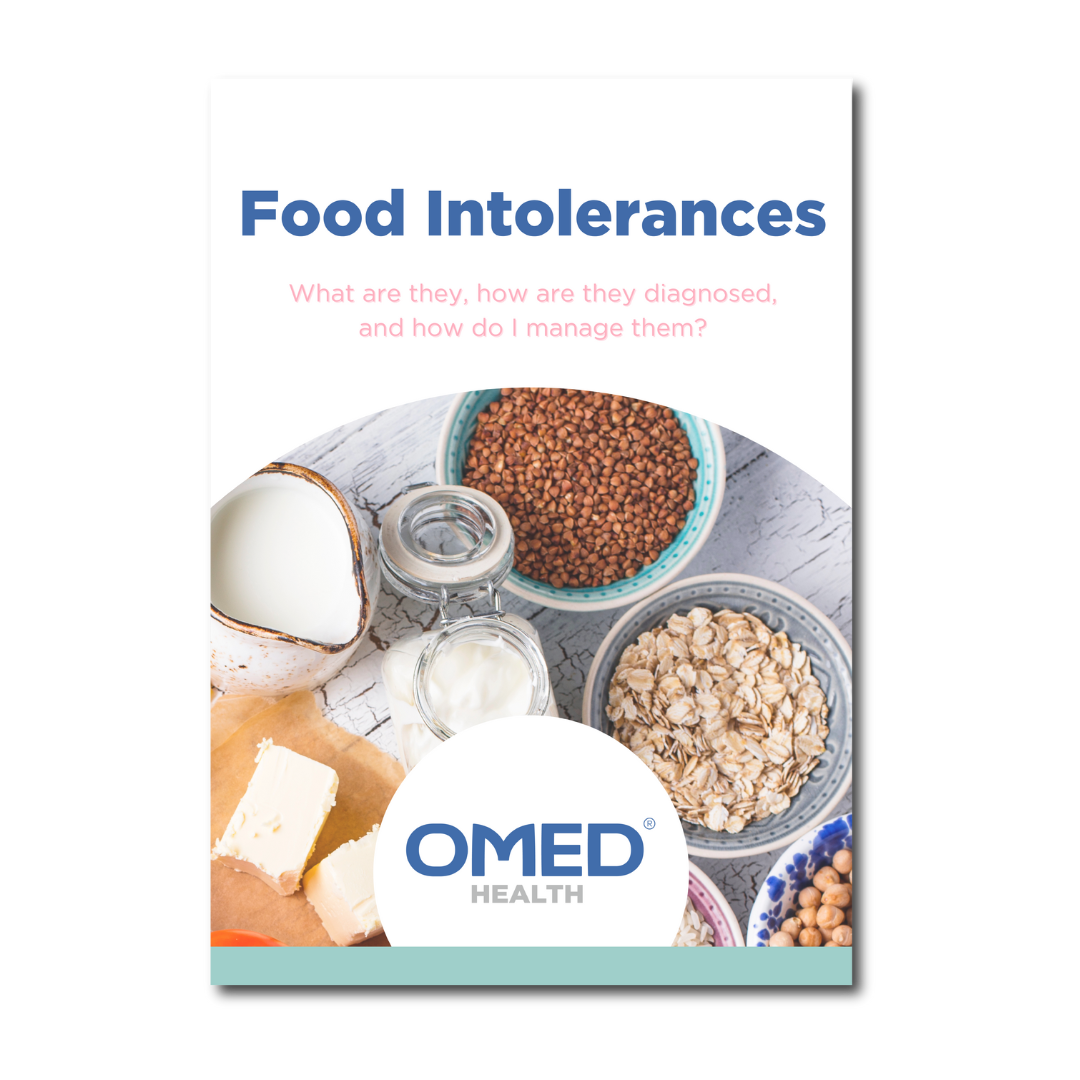1. Watch what you eat
A diverse and balanced diet is a cornerstone of good gut health. The food you eat directly influences the composition of your gut microbiome. Eating a range of foods which include prebiotics and probiotics and avoiding excessive sugar and processed foods can support a healthy, balanced gut, improve gut health and avoid various health issues associated with (disturbances or an unbalancing of the gut microbiome). These conditions include digestive issues, autoimmune diseases, and even mental health diseases.
Prebiotics are foods that are high in fiber such as vegetables, whole grains, legumes, and nuts which promote the growth of many beneficial gut bacteria. These fibers are unable to be broken down by your digestive system but can be fermented by the bacteria in the gut for use as a fuel source, producing health-promoting molecules in the process such as short-chain fatty acids that can suppress inflammation, cardiovascular disease, and even cancer1,2.
Probiotics are foods containing beneficial microorganisms. These include many fermented foods such as yogurts, kefir, sauerkraut, and kimchi. Health benefits are dependent on which strain of probiotic is introduced. These include improvement of intestinal health, enhancement of the immune response, reduction of serum cholesterol, and cancer suppression3. The gut-brain axis is a complex communication network that links the two systems. Studies have indicated that probiotics may play a role in managing conditions like anxiety and depression by influencing this gut-brain connection4.
Processed foods are damaging to gut health. The thermal process of mixing sugars with amino acids used in processed foods generates harmful advanced glycation end products (proteins or lipids that become glycated as a result of exposure to sugars) which can alter gut microbial metabolism. The artificial sweeteners that processed foods often contain also alter the microbiota. These alterations can cause dysbiosis and eating processed foods long term can affect intestinal permeability (leaky gut) and inflammation.
Fructose, glucose, and sucrose can also cause leaky gut6. These sugars are examples of FODMAP foods and are readily fermented by the bacteria in the large intestine. Excess levels result in large amounts of gas and water being produced and can result in painful symptoms.
It is important to stress that every person’s gut microbiome is different. Talk with your healthcare professional if you are concerned about the effects of changing your diet.
2. Keep track of your gut
Maintaining a record of what you are eating and any symptoms you may experience provides personalized insight into how certain foods might be affecting your energy levels, mood, digestion, and overall well-being. This includes enabling you to identify possible intolerances, keep tabs on chronic conditions, and will help your healthcare provider in identifying potential triggers and treatment options to improve gut health.
Furthermore, tracking your diet can help you ensure you’re getting a balanced intake of essential nutrients. It can highlight deficiencies or overconsumption of certain nutrients, enabling you to make dietary changes for improved overall health.
The OMED Health Breath Analyzer provides real-time measurements of hydrogen and methane levels in your breath. The companion mobile app enables you to document the symptoms you encounter, such as stomach pain, swelling, diarrhea, constipation. You can note the frequency and intensity of these symptoms, as well as identify potential triggers such as certain foods, stress, sleep patterns, or specific activities.
In conjunction with your symptoms, these gases can be indicative of possible conditions, such as small intestinal bacterial overgrowth (SIBO), lactose intolerance (milk), fructose intolerance (fruit), or other underlying factors. Our expert gut health experts will review the data to advise on a personalized treatment plan. Your data means your choice – if you would prefer, you can share your data and work with your own healthcare provider.
3. And relax…
As mentioned previously, the gut-brain axis provides a link between the two organ systems. This link goes both ways, meaning efforts to reduce stress and get enough sleep can have positive effects on gut health.
Research suggests that stress can lead to gut inflammation and immune responses through an increase in gut permeability. This is caused by the activation of the sympathetic nervous system, also known as your fight-or-flight response, and the hypothalamic–pituitary–adrenal axis by stressful stimuli. The activation of both systems increases movement of nutrients to meet the body’s perceived need in a stressful situation.
Unfortunately, this also enables bacteria and toxins to move across the intestinal wall resulting in inflammation7. To manage stress effectively, consider incorporating stress-reduction techniques into your daily routine. This could include meditation, yoga, and breathing exercises8,9.
Sleep is essential for overall health, and it also plays a role in maintaining a healthy gut. Poor sleep quality and insufficient sleep can disrupt the gut microbiome and contribute to gastrointestinal issues. You can improve your sleep quality by establishing a consistent sleep routine, creating a comfortable environment, and limiting screen time before bed10.
OMED Health is here to help you on your journey to improve gut health for a more comfortable life. Sign up for our waitlist here to ensure you get priority access when the OMED Health Breath Analyzer and App launches.
References:
- O’Keefe SJ. Diet, microorganisms and their metabolites, and colon cancer. Nat Rev Gastroenterol Hepatol. 2016 Dec;13(12):691-706. DOI: 10.1038/nrgastro.2016.165.
- Slavin J. Fiber and prebiotics: mechanisms and health benefits. Nutrients. 2013 Apr 22;5(4):1417-35. DOI: 3390/nu5041417
- Kechagia M, Basoulis D, Konstantopoulou S, Dimitriadi D, Gyftopoulou K, Skarmoutsou N, Fakiri EM. Health benefits of probiotics: a review. ISRN Nutr. 2013 Jan 2;2013:481651. DOI: 5402/2013/481651
- Huang R, Wang K, Hu J. Effect of Probiotics on Depression: A Systematic Review and Meta-Analysis of Randomized Controlled Trials. Nutrients. 2016 Aug 6;8(8):483. DOI: 3390/nu8080483
- Shi Z. Gut Microbiota: An Important Link between Western Diet and Chronic Diseases. Nutrients. 2019 Sep 24;11(10):2287. DOI: 3390/nu11102287
- Liang L, Saunders C, Sanossian N. Food, gut barrier dysfunction, and related diseases: A new target for future individualized disease prevention and management. Food Sci Nutr. 2023 Mar 7;11(4):1671-1704. DOI: 1002/fsn3.3229
- de Punder K, Pruimboom L. Stress induces endotoxemia and low-grade inflammation by increasing barrier permeability. Front Immunol. 2015 May 15;6:223. DOI: 3389/fimmu.2015.00223
- Pascoe MC, Thompson DR, Jenkins ZM, Ski CF. Mindfulness mediates the physiological markers of stress: Systematic review and meta-analysis. J Psychiatr Res. 2017 Dec;95:156-178. DOI: 1016/j.jpsychires.2017.08.004
- Cramer H, Lauche R, Langhorst J, Dobos G. Yoga for depression: a systematic review and meta-analysis. Depress Anxiety. 2013 Nov;30(11):1068-83. DOI: 1002/da.22166
- Smith RP, Easson C, Lyle SM, Kapoor R, Donnelly CP, Davidson EJ, Parikh E, Lopez JV, Tartar JL. Gut microbiome diversity is associated with sleep physiology in humans. PLoS One. 2019 Oct 7;14(10):e0222394. DOI: 1371/journal.pone.0222394

